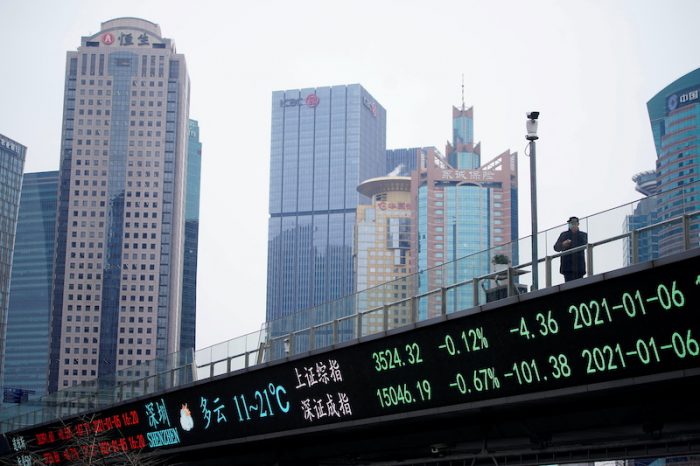Asian shares rallied on Tuesday with China stocks bouncing back strongly on hopes the recent Covid curbs protests might see an easing back on restrictions by Beijing.
Reports that Chinese health officials would hold a news conference to discuss coronavirus control measures stoked speculation that the authorities were poised to start rolling back some control measures.
Health officials said later that the government would speed up Covid vaccinations for elderly people and acknowledged that recent unrest stemmed from overzealous implementation of existing restrictions.
That saw China shares, on the mainland and in Hong Kong, surge but in Japan the focus of investors remained on the impact of the protests and continuing curbs on Chinese factory output, demand and supply chains.
Read more: China Stocks Rebound on Hopes of Quicker Covid Loosening
Japan’s Nikkei closed at a one-week low as the protests in several Chinese cities raised concerns about economic growth.
The Nikkei share average slipped 0.48% to close at 28,027.84, its lowest since November 21, while the broader Topix lost 0.57% to 1,992.97.
“The Japanese market’s decline is all due to the China issue. The ongoing protests could trigger a slowdown in global economic growth,” said Shuji Hosoi, a senior strategist at Daiwa Securities.
Technology investor SoftBank Group lost 1.37% and chip-making equipment maker Tokyo Electron fell 1.08%.
Across the East China Sea, optimism that Beijing was set to adjust course on its zero-Covid approach buoyed investors.
“News of the press has got the market excited over the possibility that we could see China continue to ease up,” said Khoon Goh, head of Asia research at ANZ.
“The yuan has rallied, and basically Chinese equities and everything else in Asia has responded positively to that.”
Shares of Chinese property companies also surged after the country’s securities regulator lifted a ban on equity refinancing for listed property firms.
That helped Chinese blue chips jump almost 3%, in the largest one-day rally in a month and a marked reversal of Monday’s steep falls.
Apple Falls on Zero-Covid Hit
MSCI’s broadest index of Asia-Pacific shares outside Japan followed with gains of 1.8% with the Hang Seng Index leading the way, soaring 5.24%, or 906.74 points, to 18,204.68.
The Shanghai Composite Index surged 2.31%, or 71.20 points, to 3,149.75, while the Shenzhen Composite Index on China’s second exchange was up 2.14%, or 42.15 points, to 2,016.22.
Underlining the far-reaching affect of Beijing’s policies, Apple shares had fallen 2.6% on reports new Covid-19 restrictions would cause a sizeable shortfall in production of iPhone Pro units.
“The zero-Covid policy has been an absolute gut punch to Apple’s supply chain,” Daniel Ives, an analyst at Wedbush, said.
“We estimate that Apple now has significant iPhone shortages that could take off roughly at least 5% of units in the quarter and potentially up to 10% depending on the next few weeks in China around Foxconn production and protests.”
Indian stocks were up with Mumbai’s signature Nifty 50 index rising 0.3%, or 55.30 points, to close at 18,618.05.
The sudden bout of optimism on China, combined with talk of possible output cuts by oil cartel OPEC, also helped oil prices rally.
US crude futures bounced $1.24 to $78.48 a barrel, having hit their lowest this year overnight, while Brent climbed $1.64 to $88.83.
Not all markets, though, seemed convinced the rally would last. Eurostoxx 50 futures were flat and FTSE futures up 0.1%.
Fed Set to Stay Aggressive on Inflation
And Richmond Federal Reserve Bank president Thomas Barkin became the latest official to douse speculation the US central bank would reverse course on interest rates relatively quickly next year.
That heightened tensions ahead of speech by Fed chair Jerome Powell on Wednesday that is shaping up to be a major messaging event as markets yearn for a pivot on policy. Analysts suspect they may be disappointed.
“We envision him basically confirming a slower pace of hikes at the December meeting, which is almost entirely priced in,” Jan Nevruzi, an analyst at NatWest Markets, said.
“But we also think he will reiterate that the Fed intends to stay in restrictive territory through next year.”
The Fed is not alone in being hawkish, with European Central Bank president Christine Lagarde warning that eurozone inflation has not peaked and could go even higher.
The dollar dipped to 138.65 yen, after briefly touching a three-month trough of 137.50 overnight. The dollar index eased 0.3% to 106.29, but had been as low as 105.31 the previous session.
The dollar also shed 0.9% against the offshore yuan to 7.1830, erasing all the gains made on Monday.
Bitcoin was again choppy after cryptocurrency lender BlockFi filed for chapter 11 bankruptcy protection along with eight affiliates.
Key figures
Tokyo – Nikkei 225 < DOWN 0.48% at 28,027.84 (close)
Hong Kong – Hang Seng Index > UP 5.24% at 18,204.68 (close)
Shanghai – Composite > UP 2.31% at 3,149.75 (close)
London – FTSE 100 > UP 0.56% at 7,516.14 (0935 GMT)
New York – Dow < DOWN 1.45% at 33,849.46 (Monday close)
- Reuters with additional editing by Sean O’Meara
Also on AF:
Yuan-Rouble Dealings Skyrocket as Russia Embraces the Redback
Japan’s Kishida Refuses to Change Policy with Central Bank
























